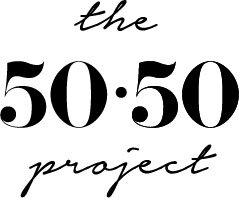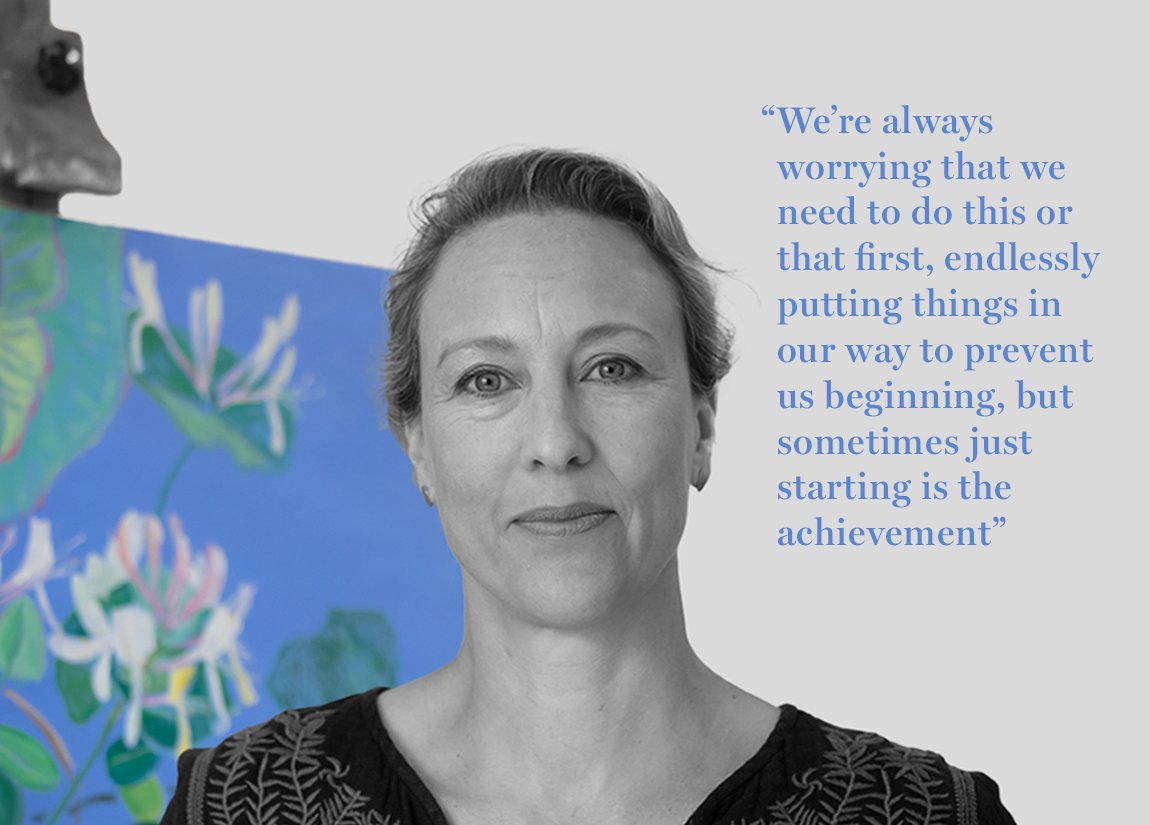Coffee with artist Victoria Sebag
Victoria Sebag
Age: 52
Artist
Coffee at Elder Press, Hammersmith
How I met Victoria…
I first met Victoria when our children were in nursery school. We lost touch for a number of years when she moved out of London to give her children more of a country life and reconnected again when she moved back to London a few years ago.
Last month, Victoria held her first solo art show in 10 years, showcasing her vibrant oil paintings, inspired by the wild landscapes and beaches of Suffolk.
A few week later, I asked how the exhibition went and if she felt pleased with the outcome. The short answer was yes, it was a success and she felt happy with the exhibition and the number of paintings she sold. The longer answer got us into a discussion about how you define success and how easy it is to focus on one arbitrary measure of success and discount other forms of success that others can clearly see you've achieved and somehow you can’t.
I think part of the issue, especially for women like Victoria and I, who came of age in the 1980s and graduated from good schools that told us we’d be future leaders in our fields, instilling in us, the idea that we could have it all. Of course, with hindsight that was never realistic. As author, coach and recent 50:50 Project interviewee, Avivah Wittenberg Cox says, you can have it all, just not all at once and probably later in life than you were expecting. Hands up anyone?
I wish someone had told me in my 20s about the need to pace and modulate my career, to be more okay with detours and better yet to learn how to embrace them and be open to the unexpected insights they can provide and importantly how to step back and re-evaluate my definition of success.
Victoria’s career is an example of pace and modulation, creativity, ingenuity and persistence. Please have a read.
Describe your career path in two or three sentences including any twist or turns ending with where you are now.
After Art School, I worked at various part-time and full time jobs in events and fashion and kept a studio where I would paint at night or on days off. Four years later, I jumped and became a full-time artist. Then I had children and painting became too hard timewise so I started designing fabrics for the interiors market, which was a totally new direction. And now that my children are older I am back painting full-time again.
What decision / experience proved to be the most helpful to your career? This could include a failure that set you up for later success.
I was going to say that there was no one thing that has proved the defining experience or decision most helpful to my career, as my career hasn’t been a direct line – as is true, for many artists who are also mothers.
It’s definitely been helpful to keep my end goal in sight even if I took a little detour along the way.
Probably, the best decision I made was to continue to do something creative whilst I was finding it hard to paint, be a full-time mother to teens and care for my parents. Starting a fabric design business (Sebag Textiles) – allowed me to carry on learning, stay creative and not lose confidence in myself.
The designs and skills I learnt during this 5-year period, have not only allowed me to look after my family as best I could but have fed into my current paintings and have given me the self-confidence to return to the art world with a passionate leap.
What advice would you give your 20-year-old self, knowing what you do now? And what advice would you tell her / him to ignore.
I would tell my 20-year-old self to not be so shy and hang out more with established people in my sector – ie. artists, gallerists, curators etc. I had a crippling shyness, a hangover from schooldays, and was incredibly intimidated by people older and more established than me. So my advice is keep hanging around people you want to meet until they notice you and don’t worry about being shy – embrace it – everyone else is too!
I also wish I’d listened more than I did. Artists typically don’t listen to others and do things their own way and so sometimes it’s very hard to listen to friends or loved ones.
Finally, find a mentor. A good mentor can be a huge ally and help you understand and navigate your world more effectively. They might also help you listen to loved ones with a less defensive ear.
What does success look like for you?
Success for me is mainly producing paintings that I’m proud of, and that connect with other people.
Secondly, success is that selling paintings is covering the costs of making paintings and, ideally, giving me an income.
However, I know that I would still want to paint whether I was able to sell the paintings or not, but it does make it easier to justify the long hours I spend in the studio to myself.
There is a weighing up in my mind sometimes of my time v. money v. indulgence v. self-care v. desire to paint v. validation, that every working mother and non-working mother will know all about and is utterly pointless!
Where or to whom do you look for inspiration?
I look for inspiration in other artists and creatives whose work and working style I respect. I also find inspiration in women in business, young people breaking boundaries and older women doing incredible things and living their best lives. In terms of my art, I find inspiration in the natural world in millions of different ways!
When you are feeling stuck or uninspired, what actions do you take or what questions do you ask yourself?
When I’m feeling stuck or tired or uninspired, I take out my inks or oil bars and work on paper with large brushstrokes. Or try collage to loosen up.
Other times I’ll make stretchers, prime canvases or clean out my studio - do something mechanical. I might work on a painting that I’ve put away to work on later because I’ve been unhappy with it and have a go at taking it in a better direction.
It’s important to forgive yourself for having an off day... and think about how to ensure that future days are more productive.
In the last 5 years what new belief, behaviour or habit has most improved your working life (or your approach to creating your post 50 work life)
The realisation that there are lots of people to help and support me in life. No one wants me to fail, and if I do – there will be somewhere there to pick me up again. This is totally new for me as I was always expecting a kick back for some reason, which is so limiting!
Also, keep working, don’t expect miracles but do celebrate the little achievements on the way, and enjoy the journey. I don’t want to focus on a distant end goal at my age – it might never happen!
If you could put one quote or piece of advice on a big billboard for everyone over 50 to see what would it be?
Like Nike says: JUST DO IT. !!
I think we’re always worrying that we need to this or that first, endlessly putting things in our way to prevent us beginning, but sometimes just starting is the achievement.
Baby steps forwards, then you can look up and decide on a direction and do a bit of jogging later.
What is the book or podcast you most recommend for someone thinking about designing their post-50 work life?
I’m definitely a book person and so many books have encouraged me – but funnily enough the one that I really gained strength from is Women who Run with the Wolves: Myths and Stories by Clarissa Pinkola Estés.
This book celebrates women of all ages, with the most wonderful storytelling and combines the magical with Jungian analysis getting deep into the female psyche in a really accessible and creative way, using the lexicon of folklore and fables.
Click here to learn more about Victoria and see her artwork.

